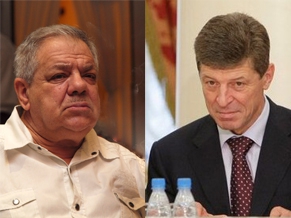|
Euroasian Jewish News

Michael Chlenov (left) and Dmitry Kozak
|
EAJC Secretary General Participates in Discussion on Interethnic Relations in the Russian Federation
25.08.2011 Euro-Asian Jewish Congress Secretary General Michael Chlenov participated in a meeting of the Consultative Group of Experts on National Communications, which took place on the 25th of August in the Russian White House, led by the head of this interdepartmental workgroup, Vice Prime Minister of Russia, Dmitry Kozak.
Among those invited to the meeting were representatives of federal national cultural autonomies, large-scale national unions, religious groups, as well as experts in inter-ethnic relations, politologists and journalists.
The main reports on the interaction of the Russian authorities with national-cultural autonomies were given by Deputy Director of the RAN Ethnology and Anthropology Institute Vladimir Zorin, President of the Federal National Cultural Autonomy of Russian Germans, Chairman of the International Union for German Culture (Internationale Verband der deutschen Kultur, IVDK) Heinrich Martens, Jewish FJNCA Vice President, EAJC Secretary General Michael Chlenov, and Head of the FENKA of Ruska Roma, Nadezhda Demetr.
After the reports, the meeting continued in a round-table format. The topics of discussion included the ethnocultural development of the peoples of Russia, the creation of harmonious interethnic relations, and the formation of the civil nation of Russia. During the meeting, Michael Chlenov gave Dmitry Kozak the report on monitoring anti-Semitism in 2010, prepared by EAJC experts.
As the EAJC Secretary General notes, "It is obvious that national and confessional problems have the most destructive potential for community stability. The hushing up of these national sores, so characteristic of the Soviet regime, eventually served to aid its downfall. National-cultural autonomies are a structure that helps avoid such problems. This is the only existing form of letgal national representation today, excepting unions of small-numbered ethnicities. The authorities need to establish more active relations with the national-cultural autonomies and stop looking at them as the organizators of amateur talent groups in ethnic style.”
|
